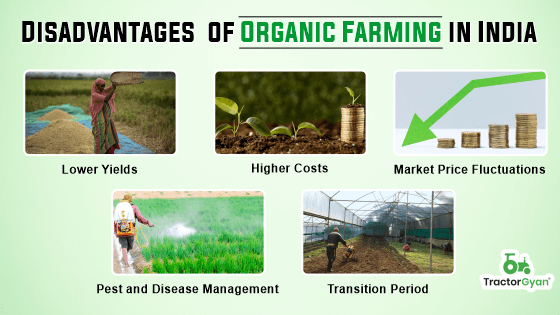
Organic farming, while celebrated for its environmental benefits and health advantages, does come with several notable disadvantages that farmers and consumers alike should consider. One of the primary concerns surrounding organic farming is its higher production costs compared to conventional methods. The stringent regulations and certification processes required to maintain organic status often result in increased expenses for farmers. These costs stem from the need to purchase organic fertilizers, pesticides, and other inputs that meet organic standards, which can be more expensive than their synthetic counterparts. Additionally, organic farming typically requires more labor-intensive practices such as hand weeding and manual pest control, further driving up operational costs.

Another significant disadvantage of organic farming is generally lower yields per acre compared to conventional agriculture. Organic farming relies on natural fertilizers and biological pest control methods, which can be slower-acting or less effective than synthetic chemicals. This slower growth and susceptibility to pests and diseases can result in reduced crop yields, impacting overall farm productivity and potentially affecting food availability and prices in the market. Farmers must carefully manage these yield limitations to maintain profitability and meet consumer demand for organic produce.
Certification complexities also pose a challenge for organic farmers. Achieving and maintaining organic certification involves rigorous inspections, record-keeping, and adherence to specific guidelines set by certifying bodies. These requirements ensure that organic products meet certain standards of production, handling, and labeling. However, the certification process can be time-consuming, bureaucratic, and costly, particularly for small-scale farmers or those transitioning to organic practices. Navigating these administrative hurdles requires dedication and resources that may deter some farmers from pursuing organic certification.
Inconsistent government support and infrastructure limitations are additional hurdles faced by organic farmers. Unlike conventional agriculture, which often benefits from extensive government subsidies and research funding, organic farming may receive less institutional support in terms of research, extension services, and market development. This can hinder the adoption and expansion of organic farming practices, limiting its scalability and impact on mainstream agriculture.
Furthermore, organic farming is vulnerable to market fluctuations and consumer perceptions. While demand for organic products has grown steadily in recent years, it remains a niche market segment compared to conventional agriculture. Variations in consumer preferences, economic conditions, and competing food trends can affect the profitability and stability of organic farming operations. Farmers must navigate these market dynamics while balancing the costs and benefits of organic production methods.
Environmental factors also play a role in the challenges of organic farming. While organic practices aim to minimize environmental impact by avoiding synthetic chemicals and promoting soil health, they may not always achieve desired outcomes in terms of resource efficiency and greenhouse gas emissions. For instance, organic farming often requires more land to produce the same amount of food as conventional methods, which can lead to deforestation or habitat loss if not managed sustainably. Additionally, organic fertilizers such as manure and compost may contribute to nutrient runoff and water pollution if improperly applied or managed.
Despite these challenges, organic farming continues to gain traction globally as consumers prioritize health, sustainability, and environmental stewardship in their food choices. Many proponents argue that the long-term benefits of organic farming outweigh its disadvantages, citing improved soil fertility, biodiversity conservation, and reduced chemical exposure for farmers and consumers. Innovations in organic farming practices, such as integrated pest management and agroecological approaches, aim to address some of the challenges associated with lower yields and higher costs, making organic agriculture more resilient and viable for diverse farming systems.
In conclusion, while organic farming offers compelling advantages in terms of environmental sustainability and consumer health, it is not without its challenges. Higher production costs, lower yields, certification complexities, limited government support, market volatility, and environmental considerations all contribute to the disadvantages of organic farming. However, ongoing research, technological advancements, and increased consumer demand for organic products are driving innovation and improvement within the organic agriculture sector. By addressing these challenges collaboratively, stakeholders can promote the continued growth and resilience of organic farming as a viable and sustainable food production system for the future.









